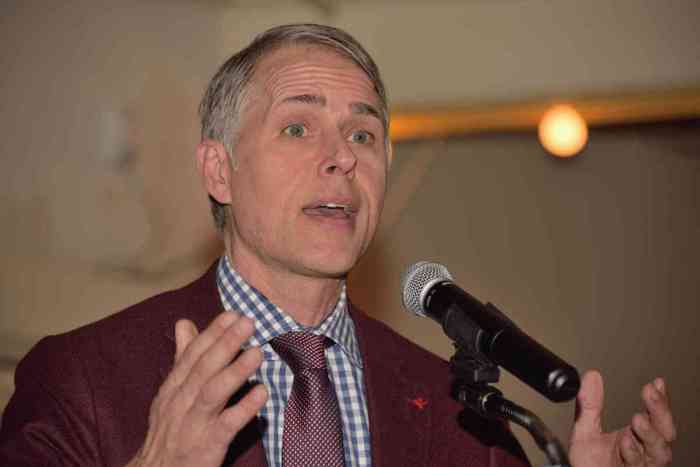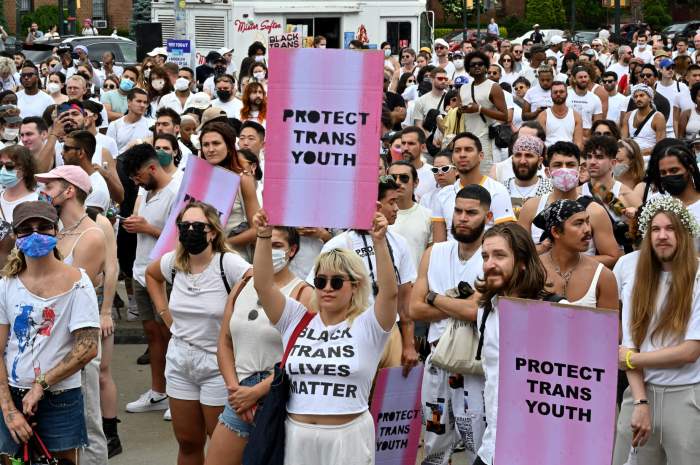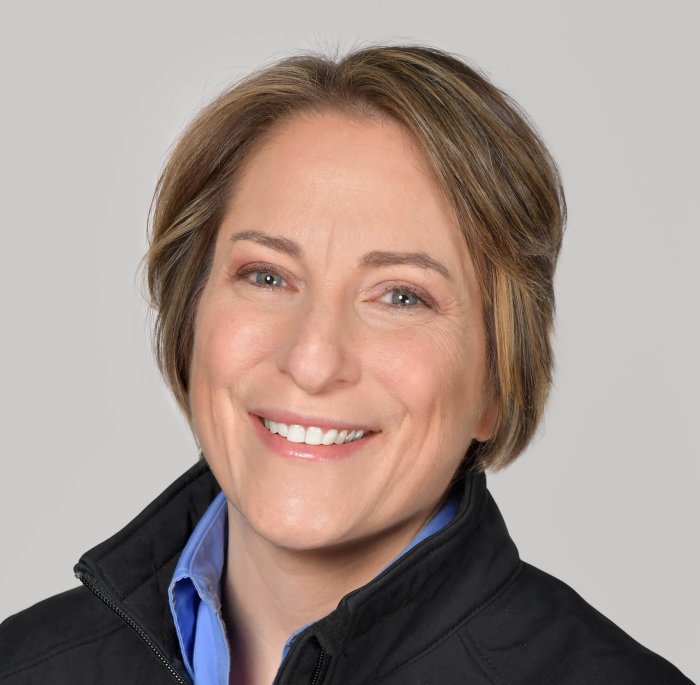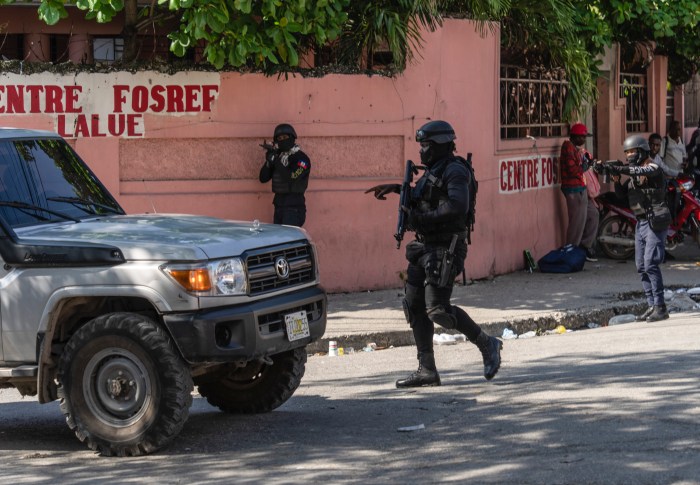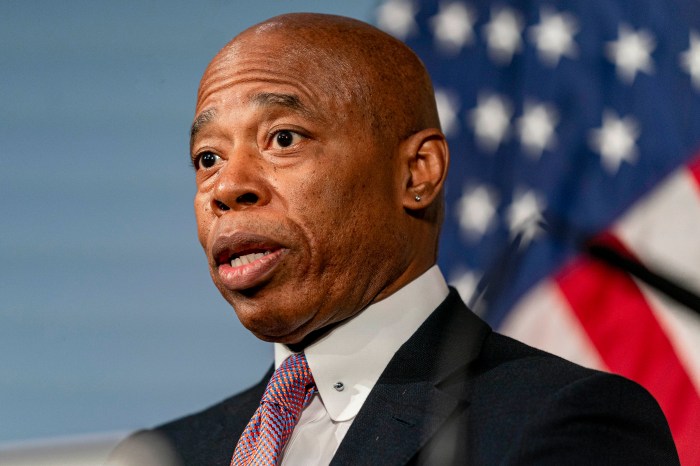Dr. Mary Bassett, the city health commissioner, at this past December's dedication of the NYC AIDS Memorial in Greenwich Village. | DONNA ACETO
Sexual health clinics in New York City hold a puzzling place in the public imagination. Are they places to get free condoms? Pregnancy exams? Blood tests?
To give you a better picture, I want to share the story of a man from Harlem who visited the Riverside clinic, on the Upper West Side (160 West 100th Street), last December. He wished to remain anonymous, so I will name him “John.” Days before his visit, John found a blemish on his skin. Suspecting a sexually transmitted infection, he looked for a clinic that offered free testing. The Riverside Sexual Health Clinic was not too far from his home. Staff checked him in immediately, with no hassles over health insurance. The doctor spoke to him, “like a person,” John recalled, and was empathic when delivering the news that John was HIV-positive.
What unfolded perfectly illustrates the role of the city’s sexual health clinics in treating sexually transmitted infections (STI) and HIV. John became one of the first New Yorkers to access the health department’s new, breakthrough program (JumpstART). Through JumpstART, patients receiving a positive HIV diagnosis can begin taking antiretroviral therapy (ART) that same day in the clinic. This is a game changer. The days of waiting weeks and weeks to start HIV medications are over.
John met with special clinic staff trained in navigating the health care system that same day. The staff member identified the most convenient appointments for John to continue his long-term treatment with an HIV specialist. He was also seen by a social worker. When John walked out of the clinic, there was no stack of paperwork to fill out, and the medicine was free of charge.
Sexual health clinics like the one at Riverside are on the front lines of our health care system, serving people who need quality care but can’t afford it. We want to honor the trust New Yorkers have when they come to us, and we know that we can do more. That’s why we are taking a revolutionary approach. We are scaling up — adding nearly 80 staff members to provide new medications, tests, and services, such as navigating the health care system and counseling — to make a dramatic change in how clinics operate as providers.
There is a reason we are taking bold steps. Our goal is to reduce the annual number of new HIV infections in New York City to no more than 600 by 2020, a level that would reduce HIV to below epidemic levels so that the number of people living with HIV would begin to decline year after year.
We are making progress — this year, as part of the city’s $23 million Ending the Epidemic initiative — for the first time, fewer than 2,500 New Yorkers were newly diagnosed with HIV. We are working hard to meet our goal by offering low- to no-cost testing and effective treatment to meet every person’s needs and reduce transmission.
For populations most at risk for exposure, we are launching the largest pre-exposure prophylaxis (PrEP) program in the country. PrEP is one pill that, when taken daily, is more than 90 percent effective at preventing HIV infection. For patients who have been exposed to HIV, but were not taking PrEP, we also provide a full, 28-day course of post-exposure prophylaxis (PEP), which should be started as soon as possible following the exposure. And for people like John, who are HIV-infected, we can now start them immediately on medication. Studies show that treating HIV-positive patients as soon as possible suppresses the virus, virtually eliminating HIV transmission and preventing the disease from progressing.
The clinics also play a key role in fighting other STIs. In New York City, like much of the country, syphilis continues to be a problem. Case rates have more than doubled in the last decade, from 7.7 per 100,000 people in 2005 to 17.9 per 100,000 people in 2015. Men-who-have-sex with men (MSM) account for 95 percent of syphilis cases, and almost half have HIV when they are diagnosed. We have also seen a rise in syphilis among women. This is particularly worrisome because infections during pregnancies can cause congenital syphilis often results in stillbirths or serious neurological problems in infants.
Many STIs do not produce any obvious symptoms — that’s why periodic screening is so important. At our clinics, anyone age 12 or older can come in for confidential syphilis, gonorrhea, chlamydia, and HIV testing. They can also receive emergency contraception and the HPV vaccine, which provides protection from the human papillomavirus (that can lead to genital warts and cervical and other types of cancer).
The expansion of these clinics represents a genuine paradigm shift in how we approach sexual health in New York City. We want to strip away the stigma, normalize testing, and help everyone who needs it. Treatment and prevention merge into one streamlined program that encourages New Yorkers to take control of their health.
John said that if the Riverside clinic wasn’t there, he wasn’t sure where he would have gone. Now, he’s on the right path to recovery and taking care of himself. “They gave me hope,” he said. “I left thinking, I’m so proud I am a New Yorker.”
Dr. Mary T. Bassett is the commissioner of the city’s Department of Health and Mental Hygiene. For locations and hours of the city’s sexual health clinics, visit www1.nyc.gov/site/doh/services/sexual-health-clinics.page.




























